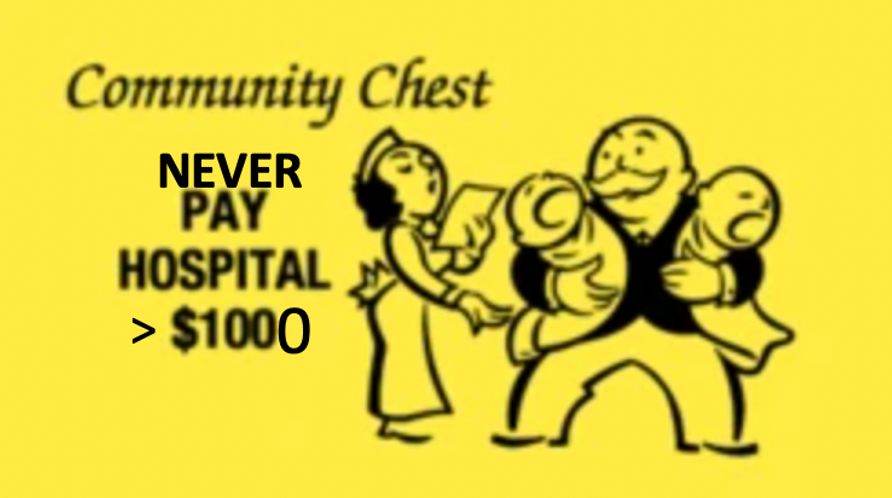Just because it's healthcare doesn't mean it's good for you.
- May 17, 2021
- 4 min read
Updated: May 18, 2021
The Birth of Quizzify (“Does wondering how Quizzify got started keep you up at night? Wonder no longer”) describes how massive overdiagnosis and overtreatment inspired me to start Quizzify.
Likewise my daughter, father and stepmother also got overdiagnosed and overtreated -- meaning they were given useless medical care that was probably also harmful. This happened simply because we didn’t know how to ask the right questions.
My daughter, as a teenager, suffered a hairline fracture in her back. The diagnosis was clear from the x-ray, and there was really no treatment for it anyway, other than rest. But the doctor ordered a CT scan anyway.

Turns out my family and I are not alone in being deluged in healthcare. The books Seeking Sickness, Overdiagnosed, Overtreated, Overdosed America and How We Do Harm address the same topic: how insured Americans -- meaning your employees -- are vastly more likely to be harmed by too much healthcare than too little.
Last week the battle was joined by The Incidental Economist (TIE), the New York Times’ economics gurus. We would recommend reading this posting, by Elsa Pearson, in its entirety. These folks are the most widely followed health services research bloggers in the country, for the simple reason that they are the best. (And I’m not just saying that because they wrote this about my own research, though that didn’t hurt.)
Many of their contributors reported exactly the kind of thing my family members and I experienced, though even more so. Here is Dr. Aaron Carroll’s experience:
When I was in medical school, I experienced a bout of extreme abdominal pain and was admitted to the hospital. My care team ordered a swath of tests, most of them unrelated to my original complaint, including multiple CT scans, an echocardiogram, and blood and urine tests, which even led to a cystoscopy. I had a significant reaction to the dye used for one of the CT scans, and I was prescribed antibiotics even though there was no indication I needed them. Ultimately, I left the hospital with diagnoses for heart- and kidney-related issues that had never impacted my health before and likely never will, and for which treatment is unnecessary. I was never told what caused my stomach pain.
Too many tests, too much treatment, and too many diagnoses. None of them were correct or even relevant...and the problem went away on its own, as many problems are wont to do.
TIE’s solutions
Their solutions are basically the same as ours, albeit not in the form of trivia games. Here is what TIE recommends.

“Ask questions.” Quizzify is all about teaching employees to ask the questions. Then they can use our downloadable app that lists the questions by disease/procedure/test for the most common ones. You can even put the questions right in your Apple Wallet. Here’s what mine looks like. You’ll see that in case you are hesitant, it says: “PS If you’re reluctant to ask, blame us.”
“Take a deep breath.” Most of the time, there is no urgency. “Early intervention” is a good idea for some things, but actually a bad idea for other problems, especially back pain. We teach that “90% of back pain will go away on its own, but 90% of people think they are in the other 10%.”
Yet an entire industry has sprung up to do “early intervention” on your employees’ back pain, and then take credit when it goes away on its own. Ask a back pain vendor if they are willing to commit to a planwide reduction in back surgeries as the valid outcome of their services, and watch them hem and haw. That, of course, is precisely how the Validation Institute measures success: in overall utilization, not participants-only or high-cost or high-risk employees only, or vs. a fabricated trend.
TIE’s best advice? “Say no.” Quizzify equips employees with the knowledge and confidence they need in order to decline suspect interventions.
And we certainly teach employees not to ask for more, which they tend to do, the title of this blog post notwithstanding. I was once explaining the added radiation hazards of CT scans on children in a presentation. One of the attendees said: "My daughter has had three." I asked why she let the doctor do them. She replied, quite matter-of-factly: "Oh, I demanded them."

We would add one more piece of advice to TIE’s list: if you hear the words: “Just to be safe,” the propose extra test that follows is likely to be inappropriate. Not always, of course, but this phrase should raise your antennae.
And that brings us back to my daughter. Those were the exact words her doctor used, and we agreed to the CT scan of her lower back, which confirmed the diagnosis and the treatment plan.
To this day, she asks me why I didn’t inquire about the radiation or question the wisdom of doing CT scans on a teenage girl (which, other than pregnant women, is probably the last cohort that should be getting scans “to be safe”). I say: “There was no Quizzify back then, so I didn’t know.”
Fortunately, your employees won’t have to make that excuse.





